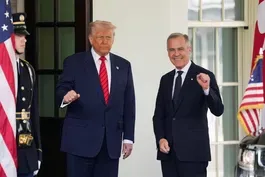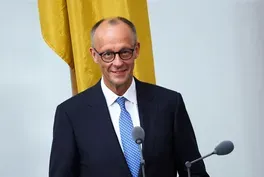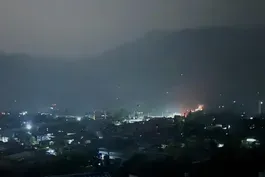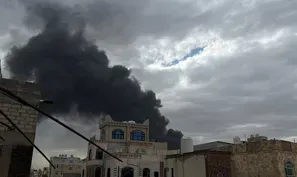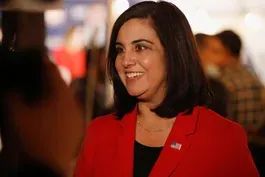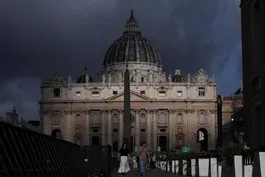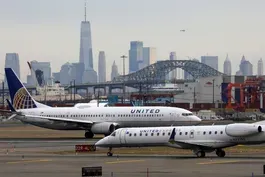
Trump's college crackdown raises concerns about free speech
Clip: 5/6/2025 | 9m 39sVideo has Closed Captions
How Trump's college crackdown is raising concerns about free speech and academic freedom
The Trump administration has embarked on a campaign aiming to remake how universities operate. The efforts to crack down on protests and diversity initiatives are part of what the White House says is a push to address antisemitism. But there are concerns about how these moves could impact academic freedom and free speech on campuses. Jeffrey Brown reports for our series, Rethinking College.
Problems with Closed Captions? Closed Captioning Feedback
Problems with Closed Captions? Closed Captioning Feedback
Major corporate funding for the PBS News Hour is provided by BDO, BNSF, Consumer Cellular, American Cruise Lines, and Raymond James. Funding for the PBS NewsHour Weekend is provided by...

Trump's college crackdown raises concerns about free speech
Clip: 5/6/2025 | 9m 39sVideo has Closed Captions
The Trump administration has embarked on a campaign aiming to remake how universities operate. The efforts to crack down on protests and diversity initiatives are part of what the White House says is a push to address antisemitism. But there are concerns about how these moves could impact academic freedom and free speech on campuses. Jeffrey Brown reports for our series, Rethinking College.
Problems with Closed Captions? Closed Captioning Feedback
How to Watch PBS News Hour
PBS News Hour is available to stream on pbs.org and the free PBS App, available on iPhone, Apple TV, Android TV, Android smartphones, Amazon Fire TV, Amazon Fire Tablet, Roku, Samsung Smart TV, and Vizio.
Providing Support for PBS.org
Learn Moreabout PBS online sponsorshipAMNA NAWAZ: The Trump administration has embarked on a pressure campaign that aims to remake how many American universities operate.
The efforts to crack down on protests and diversity initiatives are part of what the White House says is a push to address antisemitism.
Just yesterday, Education Secretary Linda McMahon told Harvard University it will not receive any future federal grants until it complies with Trump's demands.
GEOFF BENNETT: That case is now heading to court.
But well beyond the Harvard case, there are growing concerns about how these moves could affect academic freedom and the future of free speech on campuses across the country.
Jeffrey Brown reports for our series Rethinking College.
JEFFREY BROWN: A gorgeous spring day near semester's end at Wesleyan University in Middletown, Connecticut, signs of normal student life everywhere.
But here, as on many campuses around the country, something else is in the air.
MINNAH SHEIKH, Wesleyan University Student: There's fear coming not just from students, but from our parents, from faculty, and that's a very real concern.
JEFFREY BROWN: Wesleyan senior Minnah Sheikh is studying government and economics.
How does it feel this year compared to last year?
MINNAH SHEIKH: In terms of tangible impact, I think there is a lot more fear.
Instead of going to a protest just by, like, walking in or seeing a gathering and joining, I have to consider, should I put a face mask?
Should I be in picture?
Should I make myself visible?
Should I be seen?
I shouldn't be worried even as a U.S. citizen that was born in the United States.
But those are the very real conversations people are having.
KHALILAH BROWN-DEAN, Professor, Wesleyan University: So I'm glad that we could come together because there's a lot of conversation happening right now about higher education.
JEFFREY BROWN: A lot of conversation, for sure, and enormous turmoil.
Wesleyan Professor Khalilah Brown-Dean tackles these issues as head of a Campus Center for the Study of Public Life.
And on this day, she convened a roundtable of students to hear how they were feeling about recent events.
MICHAEL ASTORINO, Wesleyan University Student: When it comes to politics or controversial subjects, people are walking on eggshells out of fear that, if they say something perceived out of line, everyone will judge them.
KATIE WILLIAMS, Wesleyan University Student: Even today, I was kind of fearful of attending.
And, actually, with my friends at other schools.
I have known people to have their scholarships revoked.
KHALILAH BROWN-DEAN: If students are afraid to speak, if students are afraid of how what they say will be taken out of context or used in a particular way, it changes the very nature of what the college experience is supposed to be.
JEFFREY BROWN: Much of this recent change can be traced back to last year, when student protests over the Israel-Hamas war broke out at colleges across the nation, including at Wesleyan.
They reignited an already raging debate around free speech and academic freedom.
REP. ELISE STEFANIK (R-NY): At Harvard, does calling for the genocide of Jews violate Harvard's rules of bullying and harassment, yes or no?
CLAUDINE GAY, Former President, Harvard University: It can be depending on the context.
JEFFREY BROWN: Congressional hearings, university presidents resigning, and now direct targeting, international students arrested after protesting are speaking out, many seeing their legal status in jeopardy.
DONALD TRUMP, President of the United States: I think Harvard's a disgrace.
I think what they did was a disgrace.
They're obviously antisemitic.
JEFFREY BROWN: And billions of dollars in federal research and other funding frozen or threatened at more than 60 universities, including an effort to revoke Harvard's tax-exempt status, all in the name of stopping antisemitism on campus.
MICHAEL ROTH, President, Wesleyan University: It is meant to make people afraid, and it's working.
JEFFREY BROWN: Wesleyan's President Michael Roth has been one of the most vocal critics of what he calls an assault on higher education.
MICHAEL ROTH: I'm speaking out because it seems to me being silent does not buy you protection.
JEFFREY BROWN: Does it feel to you like free speech itself is under attack at American universities?
MICHAEL ROTH: It does.
And for the last 15 years, people who think of themselves as conservatives or even moderate liberals have said free speech is under attack at universities.
What is new here is that the government isn't just saying we want you to ensure that protests don't get out of hand.
Seems like not actually unreasonable to me.
But we want to ensure that people don't say certain things.
And in order to ensure that, we're willing to defund a diabetes research study or a cancer research study.
I mean, that use of financial or economic leverage against research, I do think, is unprecedented.
JEFFREY BROWN: One focal point, Columbia University, seen of many highly publicized protests.
The Trump administration targeted some $400 million in cuts in federal funding before Columbia agreed to a number of demands, a controversial decision within the world of academia.
The outcome is still pending.
MICHAEL THADDEUS, Professor, Columbia University: Nobody wants to express a controversial opinion about anything anymore.
JEFFREY BROWN: Michael Thaddeus teaches at Columbia and is a member of the American Association of University Professors, a national organization now suing the Trump administration.
MICHAEL THADDEUS: I'm a math professor and math is a wonderfully apolitical topic.
Math, in fact, has flourished under all kinds of authoritarian regimes.
But my colleagues who teach history, political science, regional studies, they're terrified, especially the ones who are not U.S. citizens.
JEFFREY BROWN: But for many conservatives, the real free speech struggle on campus dates back further and is rooted in a progressive ideology they say refuses to tolerate other voices or ideas.
ILYA SHAPIRO, Manhattan Institute: Finally, the leaders of educational institutions are having their feet held to the fire because I think for too long they have been able to do whatever they want.
JEFFREY BROWN: Ilya Shapiro is the author of the recent book "Lawless: The Miseducation of America's Elites."
He points to his own experience in 2022 at Georgetown Law School, when he took to social media to criticize President Biden's pledge to nominate a Black woman to the Supreme Court.
ILYA SHAPIRO: Where I poorly phrased a tweet making an argument against limiting your candidate pool for Supreme Court by race and sex.
JEFFREY BROWN: Arguing for another candidate, Shapiro tweeted that the court would be left with a -- quote -- "lesser black woman."
ILYA SHAPIRO: And that led to a four-month investigation, protests and letters and a whole inquisition by the DEI office.
JEFFREY BROWN: He was eventually cleared of wrongdoing, but decided to resign from Georgetown anyway, while pointing to other controversial posts by progressive professors who he argues were largely protected by the university.
ILYA SHAPIRO: The permissible range of expressed policy views has narrowed and shifted.
And people are afraid to express themselves or even discuss certain topics, lest they be caught in the cancellation crossfire.
To say the least, this is particularly worrying in an educational environment, where you should be trying on different kinds of arguments to learn, to get at the truth.
SABRINA SOFFER, George Washington University Student: Free speech exists for some and not for others.
JEFFREY BROWN: Some Jewish students, like George Washington University senior Sabrina Soffer and sophomore Hannah Hettena, say they often felt targeted during last year's protests, and they support the administration's moves now.
SABRINA SOFFER: Taking away funding, it does scare the universities in a positive way.
There needs to be a return to civil discourse, where we can critique the Israeli government, we can critique the way that Palestinian liberation movements express themselves.
But it needs to be equal for all.
It needs to be done in a civil way with no discriminatory harassment.
HANNAH HETTENA, George Washington University Student: It's imperative to make that threat in order to invoke real change.
And it's honestly really sad that it has to come to that.
But, if that's what needs to be done, that's what needs to be done.
DANIEL WOLF-SHNEIDER, Columbia University Student: The suppression of political speech and the sort of dismantlement of campus free speech and activism isn't making Jewish students any safer.
JEFFREY BROWN: But other Jewish students like Columbia junior Daniel Wolf-Shneider see Trump's moves in a different light entirely.
DANIEL WOLF-SHNEIDER: When an administration engages in repressive actions, with the justification of protecting Jewish students, it makes Jewish students the face of repression.
It encourages people to blame us for the chaos.
And I don't think that we should be used as a cudgel to sort of sway rhetorical goals or allow the administration, both Columbia and federal, to do whatever it wants on campus.
JEFFREY BROWN: Back at Wesleyan University, President Michael Roth agrees and says the threats universities are now facing and today's chilling of speech on campus could have broader societal implications.
MICHAEL ROTH: If we let the federal government dictate how to teach and learn on a campus, I'm afraid the government will try to tell us how to worship, what we're supposed to buy and how we're supposed to conduct our local politics.
And we don't want that to happen in the United States.
JEFFREY BROWN: For the "PBS News Hour," I'm Jeffrey Brown.
Carney shuts down Trump's threats to annex Canada
Video has Closed Captions
Clip: 5/6/2025 | 8m 5s | Carney shuts down Trump's threats to annex Canada, says tensions will take time to resolve (8m 5s)
The challenges Germany's new conservative chancellor faces
Video has Closed Captions
Clip: 5/6/2025 | 5m 18s | As Germany selects a new conservative chancellor, a look at the challenges he inherits (5m 18s)
India launches missile strikes into Pakistani territory
Video has Closed Captions
Clip: 5/6/2025 | 2m 21s | India strikes Pakistani territory in response to militant attack on tourists (2m 21s)
News Wrap: Trump says U.S. will stop bombing Houthi rebels
Video has Closed Captions
Clip: 5/6/2025 | 6m 30s | News Wrap: Trump says U.S. will stop bombing Houthi rebels in Yemen (6m 30s)
Rep. Malliotakis on breaking with GOP on Medicaid cuts
Video has Closed Captions
Clip: 5/6/2025 | 6m 4s | GOP Rep. Malliotakis on breaking with her party and taking a stand against Medicaid cuts (6m 4s)
Understanding the conclave and the selection of a new pope
Video has Closed Captions
Clip: 5/6/2025 | 7m 24s | Understanding the conclave, the secretive process to choose a new pope (7m 24s)
What's behind the major delays at Newark's airport
Video has Closed Captions
Clip: 5/6/2025 | 5m 52s | What's behind the major delays and cancellations at Newark's airport (5m 52s)
Providing Support for PBS.org
Learn Moreabout PBS online sponsorshipSupport for PBS provided by:
Major corporate funding for the PBS News Hour is provided by BDO, BNSF, Consumer Cellular, American Cruise Lines, and Raymond James. Funding for the PBS NewsHour Weekend is provided by...
